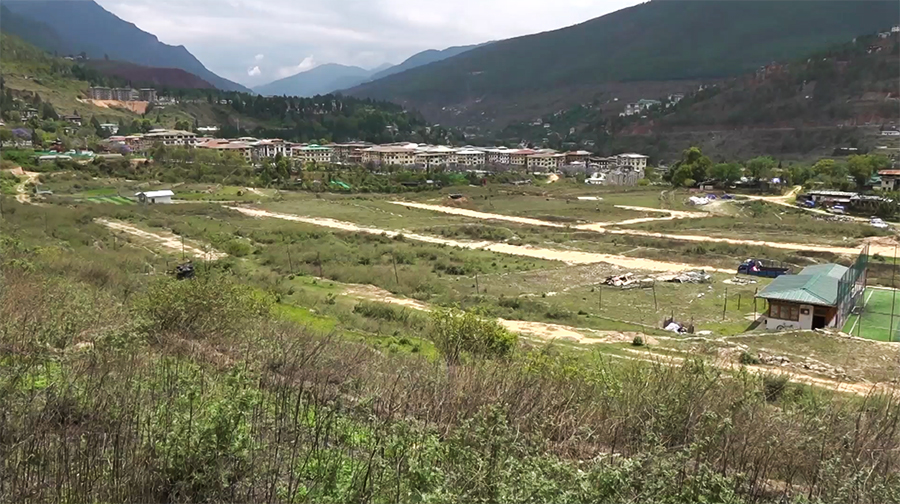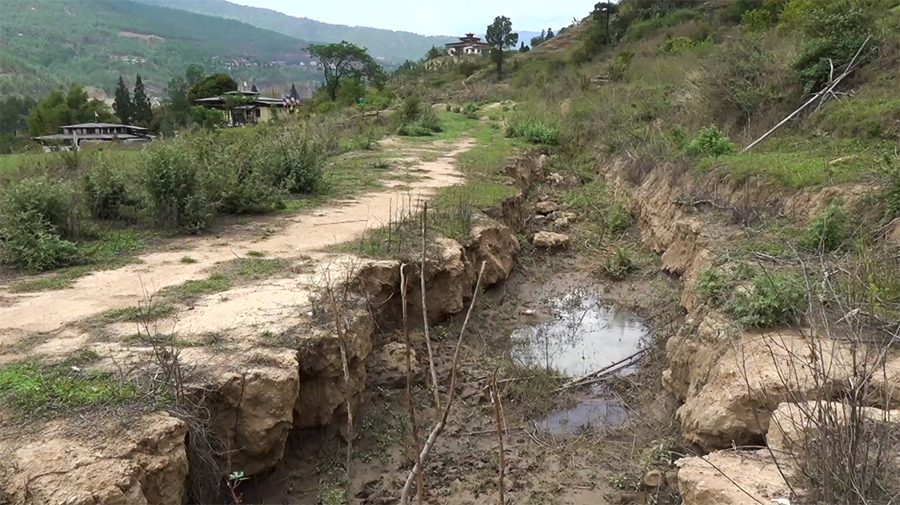 Works to extend Bajo town in Wangdue Phodrang abruptly stopped in 2022 due to the pandemic and budget constraints. Without basic infrastructure, plot owners have been unable to construct buildings on their land. They are now urging authorities to expedite the construction of the remaining amenities for the town development. Around 120 acres of land belonging to private individuals have been identified as the town extension area.
Works to extend Bajo town in Wangdue Phodrang abruptly stopped in 2022 due to the pandemic and budget constraints. Without basic infrastructure, plot owners have been unable to construct buildings on their land. They are now urging authorities to expedite the construction of the remaining amenities for the town development. Around 120 acres of land belonging to private individuals have been identified as the town extension area.
 The Bajo extended town area remains largely undeveloped, with no visible signs of construction activity. Town development works stopped toward the end of 2022 after completing internal road formation cutting work.
The Bajo extended town area remains largely undeveloped, with no visible signs of construction activity. Town development works stopped toward the end of 2022 after completing internal road formation cutting work.
There are around 270 plot owners in the area, and none have constructed any buildings on their land.
 This is because the extended town area has yet to see basic infrastructure development, which includes sewer networks, cable ducts, power supply lines, drainage systems, and footpaths.
This is because the extended town area has yet to see basic infrastructure development, which includes sewer networks, cable ducts, power supply lines, drainage systems, and footpaths.
The district administration will be developing the infrastructure when it secures funding from the government.
The extended town stretches from old Bajo town to the area below Bajo Lhakhang.
With the area remaining unused for over a decade, some landowners expressed concerns over prolonged inactivity on their land.
Some are also seeking permission to establish temporary structures to run micro-business centres or engage in agricultural activities if the development of the remaining infrastructure is going to take some more time.
“It has been around 10 to 15 years since I bought a plot in the Bajo extended town area, spending a lot of money. I paid for the plot by arranging money from others. However, the plot has remained unused without any benefit. Rather, we have to pay high land tax annually, without any exemptions or returns. It has now turned into frustration and feels more like a burden,” said Tshering Wangdi, a plot owner at Bajo.
“It would be convenient for us if the government allowed us to carry out some temporary activities on our plots, such as setting up temporary stores or car wash facilities, while we wait to complete infrastructure development. I may be the only person expressing this verbally, but around three to four hundred others suggest the same,” said Sangay Dorji, another plot owner.
“Even if we decide to start constructing today, I believe it could lead to problems in the future. Therefore, we would be extremely grateful if the infrastructure development work could be accelerated by reallocating the budget from other sources, with support from all the concerned departments and ministries. This would be of great benefit to all of us,” said Tshering Wangdi, also a plot owner.
However, the district administration says they cannot allow the construction of temporary structures as it might lead to problems in the future.
“It’s not that we do not allow them to use their plots once they are identified within the town planning area. We restrict construction activities as we cannot guarantee when development activities will begin. For example, if development works resume right after we permit them to use their plots, it could result in significant loss for them, and the government might have to compensate them. Therefore, this temporary restriction is in place to avoid such problems in the future,” said Tshering Phuntsho, Development Regulatory Officer, Wangdue Phodrang.
However, he added, the plot owners can go ahead with construction on their respective plots if they can manage the infrastructure themselves.
“For instance, if plot owners approach us requesting permission to construct houses stating that they already have access to essential infrastructure such as power and water, and can manage on their own without waiting for the government to complete infrastructure development, we are ready to issue construction permits. We have already granted permission to some plot owners.”
The initial cost for the development of the entire infrastructure and amenities was estimated to be around Nu 240 M. However, officials say, the cost might have escalated now.
According to a district official, the completion of all basic amenities is expected to take another four years.
Changa Dorji, Wangdue Phodrang
Edited by Phub Gyem









